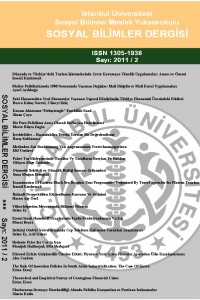Yıl 2011,
Sayı: 2, 142 - 147, 10.04.2012
Öz
ABSTRACT
In this study it is focused on contagious effect of financial crises, which generally
refers to the spread of market disturbances from one country to another. The
main objective is providing a theoretical framework for the analysis of contagious
financial crisis in this study. In order to provide such a framework first of all the
concept of financial contagion is defined from different point of views, then the
main channels of contagion; namely trade channel, economic integration, financial
linkages and asymmetric information channel are presented. Lastly, some empirical
applications in the literature of financial economics are explained briefly before the
concluding remarks.
Keywords: Contangient Financial Crises, Trade Channel, Financial Linkages,
Aasymmetric Information Channel.
ÖZET
Bu çalışmada piyasa aksaklıklarının bir ülkeden diğer ülkeye yayılması olarak
anılan finansal krizlerin bulaşma etkisi üzerine odaklanılmıştır. Temel amaç bulaşıcı
finansal krizlerin analizi için teorik bir çerçeve önerisi sunmaktır. Böyle bir
çerçeve sunmak amacıyla ilk olarak finansal bulaşma kavramı farklı bakış açılarından
tanımlanmış ve sonra da ticaret kanalı, ekonomik bütünleşme, finansal bağlantılar
ve asimetrik bilgi kanalları ana bulaşma kanalları olarak sunulmuştur. Son
olarak, sonuç bölümünden önce finans ekonomisi yazınında bazı deneysel uygulamalar
kısaca anlatılmıştır.
Anahtar Kelimeler: Bulaşıcı Fainansal Krizler, Ticaret Kanalı, Finansal
Bağlantılar, Asimetrlik Bilgi Kanalı.
Anahtar Kelimeler
Kaynakça
- Allen, Franklin and Gale, D. (2000), "Financial Contagion", The Journal of Political Economy, Volume 108, Issue 1.
- Bekaert, G., Campbell R.H. and Ng, A. "Market Integration and Contagion", NBER, Working Paper, 9510.
- CHANGA, ROBERTO AND MAJNONIB, G. (2002), "FINANCIAL CRISES FUNDAMENTALS, BELIEFS, AND FINANCIAL CONTAGION", EUROPEAN ECONOMIC REVIEW, NO. 46, PP. 801 - 808.
- Dornbusch, R., Park Y.C. and Claessens S. (2000), "Contagion: Understanding How It Spreads" The World Bank Research Observer, No.2, pp. 177-97.
- Edwards, S. (2000), "Interest Rates, Contagion and Capital Controls" NBER Working Paper 7801.
- Eichengreen, B., Rose, A.K. and Wyplosz, C. (1996), "Contagious Currency Crises", NBER Workı ing Paper 5681.
- Glick, Reuven and Rose, A. (1998), "Contagion and Trade: Why Are Currency Crises Regional?" NBER, Working Paper, 6806.
- Glicka, R. and Roseb, A.K. (1999), "Contagion and Trade: Why are Currency Crises Regional?", Jour- nal of International Money and Finance, No. 18, pp. 603-617.
- Gong-meng Chen, Michael Firth, Oliver Meng Rui, "Stock market linkages: Evidence from
- Latin America", Journal of Banking & Finance 26 (2002)
- Ito, Takatoshi & Hashimoto, Y. (2002), "High- Frequency Contagion of Currency Crises in Asia", NBER, Working Paper, 9376.
- Kaminsky, G.L., and Reinhart, C.M. (2000), "On Crises, Contagion, and Confusion", Journal of International Economics 51.
- Khalid, A.M. and Kawai, M. (2003), "Was Fi- nancial Market Contagion the Source of Economic Criı sis in Asia Evidence Using a Multivariate VAR model", Journal of Asian Economics, No. 14, pp. 131ı 156.
- Leonardo F. Hernandez, Rodrigo O. Valde', "What drives contagion Trade, neighborhood, or financial links?",International Review of Financial Analysis, 10 (2001)
- Mina, H.G., McDonald, J.A. and Chounga, Jaeyong (2003), "Dynamic Capital Mobility, Capital- Market Risk, and Contagion: Evidence From Seven Asian Countries", Japan and the World Economy, No. 15, pp. 161-183
- Nagayasu, Jun (2001), "Currency Crisis and Contagion: Evidence from Exchange Rates and Secı toral Stock Indices of the Philippines and Thailand",
- Journal of Asian Economics, No. 12 pp. 529-546.
Yıl 2011,
Sayı: 2, 142 - 147, 10.04.2012
Öz
Kaynakça
- Allen, Franklin and Gale, D. (2000), "Financial Contagion", The Journal of Political Economy, Volume 108, Issue 1.
- Bekaert, G., Campbell R.H. and Ng, A. "Market Integration and Contagion", NBER, Working Paper, 9510.
- CHANGA, ROBERTO AND MAJNONIB, G. (2002), "FINANCIAL CRISES FUNDAMENTALS, BELIEFS, AND FINANCIAL CONTAGION", EUROPEAN ECONOMIC REVIEW, NO. 46, PP. 801 - 808.
- Dornbusch, R., Park Y.C. and Claessens S. (2000), "Contagion: Understanding How It Spreads" The World Bank Research Observer, No.2, pp. 177-97.
- Edwards, S. (2000), "Interest Rates, Contagion and Capital Controls" NBER Working Paper 7801.
- Eichengreen, B., Rose, A.K. and Wyplosz, C. (1996), "Contagious Currency Crises", NBER Workı ing Paper 5681.
- Glick, Reuven and Rose, A. (1998), "Contagion and Trade: Why Are Currency Crises Regional?" NBER, Working Paper, 6806.
- Glicka, R. and Roseb, A.K. (1999), "Contagion and Trade: Why are Currency Crises Regional?", Jour- nal of International Money and Finance, No. 18, pp. 603-617.
- Gong-meng Chen, Michael Firth, Oliver Meng Rui, "Stock market linkages: Evidence from
- Latin America", Journal of Banking & Finance 26 (2002)
- Ito, Takatoshi & Hashimoto, Y. (2002), "High- Frequency Contagion of Currency Crises in Asia", NBER, Working Paper, 9376.
- Kaminsky, G.L., and Reinhart, C.M. (2000), "On Crises, Contagion, and Confusion", Journal of International Economics 51.
- Khalid, A.M. and Kawai, M. (2003), "Was Fi- nancial Market Contagion the Source of Economic Criı sis in Asia Evidence Using a Multivariate VAR model", Journal of Asian Economics, No. 14, pp. 131ı 156.
- Leonardo F. Hernandez, Rodrigo O. Valde', "What drives contagion Trade, neighborhood, or financial links?",International Review of Financial Analysis, 10 (2001)
- Mina, H.G., McDonald, J.A. and Chounga, Jaeyong (2003), "Dynamic Capital Mobility, Capital- Market Risk, and Contagion: Evidence From Seven Asian Countries", Japan and the World Economy, No. 15, pp. 161-183
- Nagayasu, Jun (2001), "Currency Crisis and Contagion: Evidence from Exchange Rates and Secı toral Stock Indices of the Philippines and Thailand",
- Journal of Asian Economics, No. 12 pp. 529-546.
Toplam 17 adet kaynakça vardır.
Ayrıntılar
| Birincil Dil | Türkçe |
|---|---|
| Bölüm | Makaleler |
| Yazarlar | |
| Yayımlanma Tarihi | 10 Nisan 2012 |
| Yayımlandığı Sayı | Yıl 2011 Sayı: 2 |

